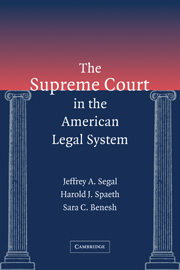Book contents
13 - Opinions and Assignments
Published online by Cambridge University Press: 05 June 2012
Summary
The Supreme Court's role as a national policymaker depends in most cases substantially less on its decision on the merits – who wins or loses – than on the opinion of the Court, which establishes the policy guidelines that affected actors (e.g., lower court judges, executive branch officials, and private citizens) must follow. It matters less that Jane Roe won her famous suit against Texas's abortion statute than that the Supreme Court's opinion in that case essentially established abortion on demand as national policy. Nor does it matter to many that Barbara Grutter lost her bid to be admitted to the University of Michigan Law School. The case made national headlines because the Court's opinion declared that race could legally be used as a factor in university admissions.
Not so with Bush v. Gore. So irrelevant was the Court's opinion that the unconscionably cynical Court did not even accept it as a precedent worthy of future adherence. “Our consideration is limited to the present circumstances, for the problem of equal protection in election processes generally presents many complexities.” As much or more “complexity” exists in other aspects of equal protection, such as affirmative action, voting, employment, juvenile justice, indigency, and immigration policy. What mattered in Bush v. Gore was that the recount was over: Bush won, period.
Hypocritical as this aspect of the case is, Bush v. Gore still exemplifies certain common aspects of the opinion-writing process: attempts at persuasion, concurring opinions, and vehement dissents.
- Type
- Chapter
- Information
- The Supreme Court in the American Legal System , pp. 332 - 360Publisher: Cambridge University PressPrint publication year: 2005



